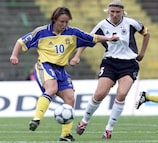2001: Hanna Ljungberg
Saturday, July 7, 2001
Article summary
For a player who retired aged 30 in 2009 after enduring years of injury problems, Hanna Ljungberg nonetheless has written herself into women's, and Swedish, football history.
Article top media content

Article body
For a player who retired aged 30 in August 2009 after enduring years of injury problems, Hanna Ljungberg has nonetheless written herself into women's, and Swedish, football history.
As a teenager Ljungberg played in the 1996 Olympics and 1997 UEFA European Women's Championship, but it was in inspiring Sweden to the final of the continental competition in 2001 and the 2003 FIFA Women's World Cup that the forward made her name. She has since featured on stamps alongside the likes of Nils Liedholm, as well as winning two UEFA Women's Cups with hometown club Umeå IK. But the way her first campaign ended in 1996 was to become familiar. "I played in the 1996 Olympics," Ljungberg told UEFA.com. "I was young, just 18. We played quite well before losing to Germany." Indeed, the defeat in the last four was to be echoed in 2001 and 2003 – except those final losses were by golden goal.
Sweden exited the 1999 World Cup against Norway in the quarter-finals but two years later in Germany, after losing 3-1 to the hosts in their opening game – despite Ljungberg scoring first – they hit top form. Ljungberg struck again as a 4-0 defeat of England and a 1-0 win against Russia ensured a semi-final berth, where Norway were beaten by a solitary goal. That set up a rematch with Germany and, despite having to content with a 18,000 home crowd in Ulm, and heavy rain, Ljungberg proved a handful. Yet sudden death extra time was the rule in 2001, and it was scored by Germany substitute Claudia Müller on 97 minutes. "We came quite close, but lost again to Germany," Ljungberg said. "We struggled more with the media, it was hugely different to now. That was the first championship where there was a lot of interest, that was new for us. We had to struggle with the type of questions we don't have any more."
There was no doubt the Sweden women's team had entered the public eye, making it vital that they performed well at the 2003 World Cup in the United States. Like two years before, the campaign began with a 3-1 loss to the hosts, but Ljungberg was in superb form and her two goals against Nigeria in a 3-0 win ensured a quarter-final slot, and Brazil and Canada were beaten 2-1. In the final Ljungberg opened the scoring late in the first half, only for Maren Meinert to equalise and Nia Kuenzer headed the golden goal.
Women's football was nevertheless secure in Sweden, whose professional league is now televised. "[The 2003 World Cup] started it," Ljungberg said. "After the European championship there is a year without a championship and as always the interest goes down, there are a lot of other events. But in 2003 we did something which no one expected." Two years later Sweden were beaten in the European semi-finals by Norway, and Ljungberg's injury problems were starting to hit, restricting her in England and at the 2007 World Cup. She bowed out of international football at the end of 2008 after winning 130 caps and scoring 72 goals.
